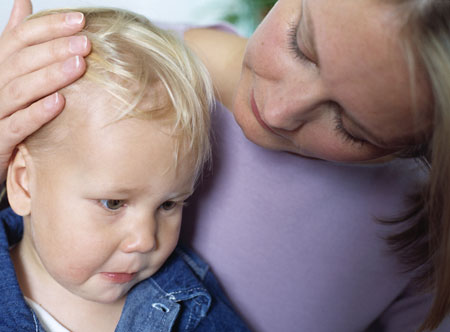The occasional bout of diarrhoea can be due to a number of causes, the most common being gastroenteritis caused by a viral or bacterial infection from contaminated food. Other causes can be food intolerance, a reaction to drugs, such as antibiotics, or something that has disagreed with them. The small intestine lining becomes damaged, so that food passes through without the usual amount of water being absorbed, leading to a ‘runny tummy’. In babies and young children, diarrhoea can be very serious because of the risk of rapid dehydration, especially if accompanied with vomiting. Sometimes diarrhoea can be a symptom of another problem such as stress or nerves.
What you can do
In moderately severe diarrhoea, try to avoid giving a baby milk (except breast milk) until the diarrhoea starts to settle. Give instead an electrolyte mixture, which can be bought ready prepared from chemists and which will help restore the body’s lost water and salts. Alternatively, give a cup of water with a pinch of salt and one teaspoon (5ml) of sugar. You can also give small sips of water or very diluted juice. In young children milk can be gradually reintroduced once the diarrhoea begins to improve. Avoid apple juice, as this can trigger the condition.
Treatment
Medical attention should be sought, but the following complementary therapies may also be beneficial:
Homoeopathy
A homoeopath may prescribe Baptisia for ‘flulike symptoms and gastritis and Belladonna, if accompanied by a raised temperature. If the diarrhoea is due to a stress-related problem for the child, Gelsemium may be used, or Borax if the child is particularly nervous.
Acupuncture
An acupuncturist would look at a number of possible causes of the diarrhoea. It may be due to overeating or irregular eating, particularly of foods seen as having a ‘cold’ influence, or different types of weather, such as damp or summer heat, may have an effect. Illness and the use of antibiotics can affect the bowel. Or the child may have a weak constitution or have had a severe illness. Depending on what the acupuncturist sees as the cause, treatment will vary, to make up for deficiencies, for instance in the stomach and spleen.
Naturopathy
Diarrhoea more often occurs in bottlefed rather than breastfed babies. Give water rather than a bottle for twenty-four hours, while monitoring closely for signs of dehydration. If a breastfed baby has diarrhoea, the mother should look at her own diet for the cause, as it may be a sign of allergy to certain foods. If an older child is prone to diarrhoea, a close look at their diet may be necessary. A naturopath will advise that suppressants should not be used, as diarrhoea is the body’s natural way of eliminating unwanted waste. Fluids should be kept up – taking regular sips every twenty minutes or so. A gradual return to solids, keeping foods simple such as white toast, green apples without their skin and bananas (remove the central vein), is best. Supplements and mineral salts such as potassium chloride, sodium sulphate and iron phosphate may be recommended.
Kinesiology
A test will be carried out to check for an imbalance in the bowel, for instance after a stomach bug. Various points may be rubbed to correct the imbalance and relieve any uncomfortable symptoms.
Caution
Call for medical help immediately if a baby or young child shows signs of dehydration following diarrhoea. Symptoms include drowsiness, lethargy, lack of response, glazed eyes, persistent crying, a depressed fontanelle, loose skin. A doctor should also be called if diarrhoea persists for more than six hours. Serious cases may need hospital treatment with intravenous fluids.
